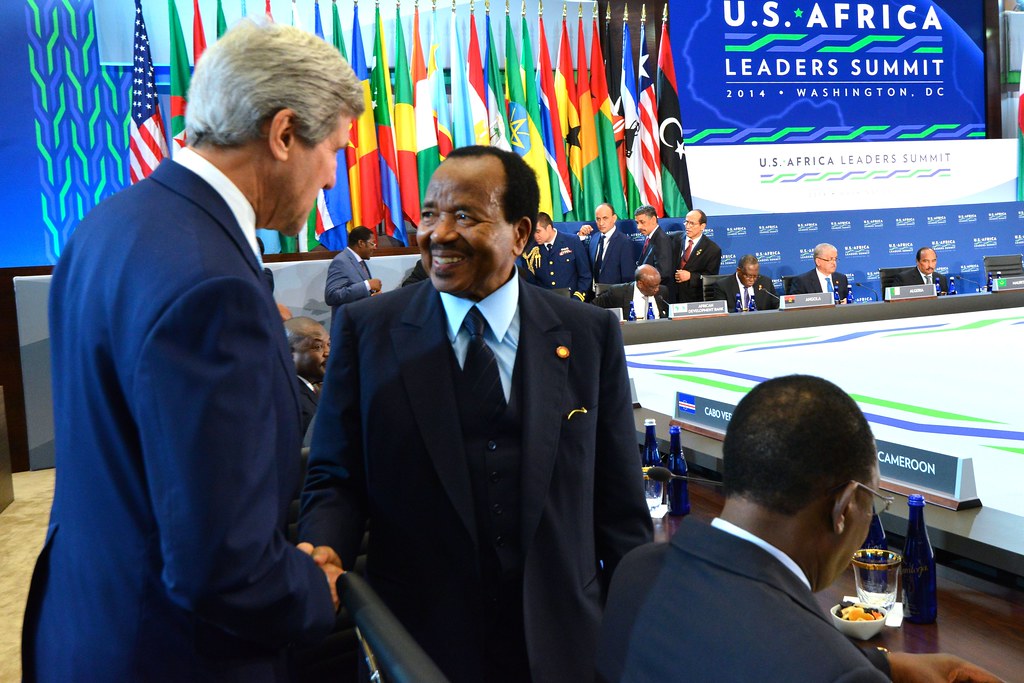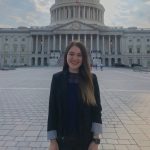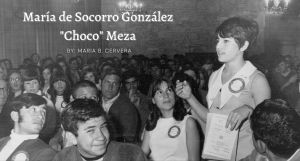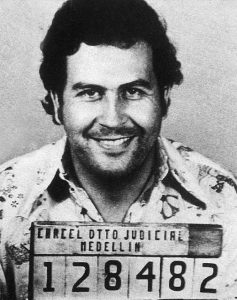The Republic of Cameroon, originally named Kamerun, is located in West Africa. The current President is Paul Biya, who is also one of only two presidents that Cameroon has had and the longest-serving leader in Africa, for over thirty years. Biya started his political career at the age of 43, as Cameroon’s Prime Minister under Ahmadou Ahidjo in 1975, becoming his successor in 1982. Because of his presidential ability, Biya modified the Cameroonian Constitution to allow presidents to serve for more than two terms and to be eligible for re-election every seven years.1 Even though Biya’s previous presidential elections ran smoothly, as 2016 arrived, Biya knew he would be faced with a formidable opponent, the Southern Cameroons National Council (SCNC).
In 1955, Kamerun gained independence from France and Great Britain. Then, in 1961, Ahmadou Ahidjo was elected President and renamed the country to the Federal Republic of Cameroon. Five years later, Ahidjo banned all political parties to avoid the lobbying of ethnic groups that were seen as a threat to national unity, including English-speaking communities.2 Nonetheless, in 1972, Cameroon created a new constitution that declared French as the language of the Eastern state and English as the language of the Western state, although English actually dominated Cameroonian commerce, technology, education, and politics.3 Yet, French officials saw this constitutional provision as a threat, and used French as the administration’s language of preference.4
After twenty-two years of ruling Cameroon, Ahidjo was pressured to resign by the French socialist government.5 His successor was his former prime minister, Paul Biya.6 Biya continued under Ahidjo’s party, Cameroonian National Union (CNU). Shortly after, former president Ahidjo regretted his decision in assigning Biya as his successor and attempted to overthrow him through a coup.7 For this reason, Ahidjo fled into exile in 1983 for attempting to conspire against the government. Absent from his trial, he was found guilty and sentenced to death.8 Biya then renamed Cameroon to the Republic of Cameroon and created the Cameroonians People’s Democratic Movement (CPDM) party, which later won the majority of the seats in parliament, thereby turning Cameroon into the most corrupt country in the world, according to Transparency International.
In December 1990, President Biya legalized the creation of a multiparty system to prove his party’s legitimacy. This introduced the union of parties with a connection to specific ethnic groups or provinces.9 When the first elections were held, Biya’s party won less than fifty percent of the seats, whereas the new parties won over sixty-eight percent of the seats. Biya knew he would have a problem if he did not join forces with the newly elected ruling party, so he did.10
With the establishment of a multiparty system, the anglophone regions organized a meeting in 1993 to promote a return to federalism, known as the All Anglophone Conference (AAC). However, the proposal was rejected twice by the Consultative Committee for Review of the Constitution. This did not stop the anglophone community as they created a council to encourage the two-state federation known as the Southern Cameroons National Council (SCNC). The SNCS members continued to hold protests in the anglophone provinces every October 1, advocating for their independence, calling it the Republic of Ambazonia.11

As an attempt to fix this problem, Biya modified the constitution in 2008, in agreement to establish English and French as the official languages, so they could both share equal status.12 However, in 2016 the French-speaking government imposed the use of French language in schools and courts in anglophone parts of Cameroon.13 In opposition to this, English-speaking teachers and lawyers protested against the employment of French-speaking educators and officials, who did not speak English and had no prior knowledge over the judicial courts. This alteration became known as the “anglophone crisis.”14 Anglophones argued that their minority rights were being violated and felt their judicial, educational, and local government systems should be protected. Both, anglophone lawyers and teachers formed the Cameroon Anglophone Civil Society Consortium (CASCSC). Meanwhile, Biya and his French-administered government were calling the anglophone activists “separatists.”15

In October 2017, the anglophone separatist leader, Julius Tabe, declared the independence of the Republic of Ambazonia. With elections less than a year away, Biya knew he had to do something about this. He was not going to let any “separatist” seize the country he has been leading for thirty-five years. Biya responded to this act by shutting down the internet for three months, banning the CACSC and SCNC, and incarcerating several leaders of these movements.16 This instigated violent protests in major cities in Northwest and Southwest Cameroon, leaving many dead and injured.17 The violence caused over 30,000 Cameroonians to flee their homes into the neighboring country, Nigeria.18 During 2017, several businesses, government buildings, automobiles, and schools had been set on fire in the anglophone regions by, both, the anglophones and francophones. As a result, schools were shut down for over a year, leaving hundreds of children without an education. Additionally, because of the protests by the anglophone community, Biya made several policies, such as the banning of any crowds with more than four people, imposing curfews, and deploying military forces into anglophone regions of Cameroon seeking to kill any “separatists” that may be a threat to the country.19

Biya was not going to let an opposing party diminish his chances of reelection, much less would he let them destroy the country he had built for over thirty years. According to an International Crisis Group, one of Cameroon’s Supreme Court justices was arrested for funding an anglophone campaign in 2017, and since then has been imprisoned. Because of these occurrences and the violence between both groups, anglophone communities were left in fear and without shelter, food, water, or healthcare. Throughout this time, Biya denied the existence of an “anglophone crisis.” Instead, the ruling party, Cameroon People’s Democratic Movement (CPDM), organized the first celebration of Cameroon’s reunification in support of the Republic of Cameroon and President Biya.20
Biya frightened thousands of individuals that only half of the country’s eligible voters partook in the presidential election and in October 2018, Paul Biya won his seventh presidential term. The opposition party called for a re-run of the presidential election in 2018 but was denied by the Constitutional Council, leaving the inhabitants of Cameroon in desperation for reform and an end to the language division. Today, President Biya has shown no signs of a compromise; instead, he continues to send military troops to kill or arrest those who appear a threat to the Republic of Cameroon.
International organizations, including the United Nations, European Union, and African Union have urged the anglophone and francophone parties to abstain from violence. and to preferably engage in a dialogue to reach an agreement that compliments both parties. However, Biya claims it has attempted numerous methods to deal with the anglophone community.21 Up to the present moment, Biya does not have a successor to follow his presidency, leaving critics to believe that the only way for Cameroon to prosper is to have a change of president. For now, Biya does not plan on letting anyone get in his way.
- Constitute, “Cameroon’s Constitution of 1972 with Amendments through 2008 PDF file,” Constitute Project, August 12, 2019, https://www.constituteproject.org/constitution/Cameroon_2008.pdf?lang=en. ↵
- “Cameroon’s Worsening Anglophone Crisis Calls for Strong Measures,” International Crisis Group, July 12, 2018, https://www.crisisgroup.org/africa/central-africa/cameroon/130-cameroon-worsening-anglophone-crisis-calls-strong-measures. ↵
- Carlous Muluh Nkwetisama, “Rethinking and reconfiguring English language education: Averting linguistic genocide in Cameroon,” International Journal of Applied Linguistics and English Literature 6, no. 6 (2017): 106. ↵
- Bernard Fonlon, “The language problem in Cameroon. (An historical perspective),” Comparative Education 5, no. 1 (1969): 38. ↵
- Tangie Nsoh Fonchingong, “Multipartyism and democratization in Cameroon,” Journal of Third World Studies 15, no. 2 (1998): 122. ↵
- BBC, “Cameroon profile – Timeline,” BBC News, October 22, 2018, https://www.bbc.com/news/world-africa-13148483. ↵
- Paul Lewis, “Cameroon Radio Says An Attempted Coup Has Failed,” The New York Times, April 7, 1984, https://www.nytimes.com/1984/04/07/world/cameroon-radio-says-an-attempted-coup-has-failed.html. ↵
- Glenn Fowler, “Ahmadou Ahidjo of Cameroon Dies; Ex-Leader was 65,” The New York Times, December 2, 1989, https://www.nytimes.com/1989/12/02/obituaries/ahmadou-ahidjo-of-cameroon-dies-ex-leader-was-65.html. ↵
- Tangie Nsoh Fonchingong, “Multipartyism and democratization in Cameroon,” Journal of Third World Studies 15, no. 2 (1998): 120. ↵
- The Commonwealth, “Cameroon: Constitution and politics,” Accessed 2020, https://thecommonwealth.org/our-member-countries/cameroon/constitution-politics. ↵
- “Cameroon’s Worsening Anglophone Crisis Calls for Strong Measures,” International Crisis Group, July 12, 2018, https://www.crisisgroup.org/africa/central-africa/cameroon/130-cameroon-worsening-anglophone-crisis-calls-strong-measures. ↵
- The Commonwealth, “Cameroon: Constitution and politics,” Accessed 2020, https://thecommonwealth.org/our-member-countries/cameroon/constitution-politics. ↵
- Siobhan O’Grady, “Divided by Language,” The Washington Post, February 5, 2019, https://www.washingtonpost.com/graphics/2019/world/cameroon-anglophone-crisis/. ↵
- BBC, “Cameroon profile – Timeline,” BBC News, October 22, 2018, https://www.bbc.com/news/world-africa-13148483. ↵
- Siobhan O’Grady, “Divided by Language,” The Washington Post, February 5, 2019, https://www.washingtonpost.com/graphics/2019/world/cameroon-anglophone-crisis/. ↵
- Nna-Emerka Okereke, “Analysing Cameroon’s Anglophone Crisis,” Counter Terrorist Trends and Analyses 10, no. 3 (2018): 9. ↵
- “Cameroon’s Worsening Anglophone Crisis Calls for Strong Measures,” International Crisis Group, July 12, 2018, https://www.crisisgroup.org/africa/central-africa/cameroon/130-cameroon-worsening-anglophone-crisis-calls-strong-measures. ↵
- Siobhan O’Grady, “Divided by Language,” The Washington Post, February 5, 2019, https://www.washingtonpost.com/graphics/2019/world/cameroon-anglophone-crisis/. ↵
- “Cameroon’s Worsening Anglophone Crisis Calls for Strong Measures,” International Crisis Group, July 12, 2018, https://www.crisisgroup.org/africa/central-africa/cameroon/130-cameroon-worsening-anglophone-crisis-calls-strong-measures. ↵
- “Cameroon’s Worsening Anglophone Crisis Calls for Strong Measures,” International Crisis Group, July 12, 2018, https://www.crisisgroup.org/africa/central-africa/cameroon/130-cameroon-worsening-anglophone-crisis-calls-strong-measures. ↵
- “Cameroon’s Worsening Anglophone Crisis Calls for Strong Measures,” International Crisis Group, July 12, 2018, https://www.crisisgroup.org/africa/central-africa/cameroon/130-cameroon-worsening-anglophone-crisis-calls-strong-measures. ↵




52 comments
Danielle Slaughter
I hate to say that I find this “interesting” since there has been so much violence and death and immorality involved in this situation in Cameroon, but as a bit of a linguistics nerd, I can’t help but marvel at these divisions along linguistic lines. At first, this animosity between the anglophones and francophones might seem superficial at best; but the very concept of language often has centuries of cultural, ethnic, and sometimes even religious context that all feeds into potential tension and the release of it, unfortunately often via violence.
Rhys Kennedy
When I first stumbled upon this article I was very surprised and interested in its title, and in all fairness, I thought it was just an exaggeration. Though it seems as though I misunderstood the title; while probably a reference to “The Purge” I would have thought it to be less of a literal reference, but after reading the actions taken by President Biya I see that it is very literal. I hope that in the near future reform takes place and solutions are seen.
Donte Joseph
I was completely unaware of this crisis before I read this article, but I am glad that I took the time to read and educate myself on the topic. The sole idea that a language difference sparked something as hostile as this is mind blowing. Reading about dictators such as this one makes me grateful that in America, we elect our “leader” instead of chancing a person who might decide to let people live or die.
Adrianna Hernandez
Great article! The word “purge” caught my attention and made me believe it was related to it. But it didn’t in reality it made me see a crisis at The Republic of Cameroon. Which I wasn’t aware of until I started to read the article. I find it shocking that Biya has been the leader for over thirty years, which makes it seem that Cameroon is under a dictatorship. It saddens me knowing that he’s willing to do whatever’s in his hands to get rid of people that might or will interfere with elections.
Caroline Bush
Great article! I had not heard much about Cameroon and the ongoing crisis they are facing but having read your article I now plan to follow it more closely. Tragically, the citizens of Cameroon are being forced to endure such cruel treatment by their own president. It is upsetting when a leader cares more about themselves and less about the citizens he is supposed to serve. President Biya’s presidency can be more equated to a dictatorship and hopefully, a peaceful solution can be reached that will benefit the citizens of Cameroon.
Andres Garcia
Lesley, this article was very well written. I was intrigued by the title of this article and I am dumbfounded to hear about this story for the first time. It is very troubling to see the countless human rights violations at play in Cameroon and the immense power the president has. The fact that the president of Cameroon had the power to shut off the internet and silence the opposition like that should be reason enough for the UN to intervene. This article really made me realize how much we take the United States for granted.
Angela Perez
I find it so interesting that a difference in language preferences ignited such a hostile crisis. There is no doubt that President Biya is not looking for a way to compromise and is soley focused on remaining in power. I was unaware of this crisis prior to reading this article, the sequence of events was written extremely well and brought much needed attention to this crisis.
Emilia Caballero Carmona
Hey Lesley! The word “purge” in the title of your article caught my attention because I recently watched one of the Purge movies. I had heard That Cameroon had a conflicting governmental history which made it interesting to me to read the article because I didn’t know what exactly those conflicts were. Now I know that the conflicts are due to corruption within the government and it’s upsetting to see that President Biya is only doing what benefits him but not his country.
Lulu Guadalupe Avitua-Uviedo
Reading an article is an eye opener. I’m so glad we have the freedom to vote for who we want in office. A dictatorship would take away all our rights of freedom. Our country is not perfect by no means, there is corruption in every office, but to have someone who is to be our leader have complete control over our lives, that would be horrific. When Byia frighten thousands of individuals that only half the country’s eligible voters actually voted and Byia won again is unbelievable, to set fear simply to win an elections is no different than bribery. To want to win an election at what ever cost is not an election make, it’s more of handing your freedom over to be controlled by someone else. Good article can cause great discussion.
Berenice Alvarado
The title is very interesting. As soon as I open the article I was hooked. I started to think how drastically our country can change if we did not have a federal republic system. There probably be more violence and more deaths through out the country. It is better to have a president that the people chose than to have a dictator. This article was interesting to read and also very informative.